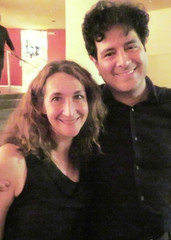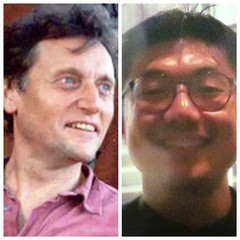|
Back
Michel Galante’s Spatial Odyssey New York
St. Peter’s Church
04/29/2019 -
“ Vortex Temporum”:
Alban Berg: Adagio from Kammerkonzert (Arranged for quintet by Michel Galante)
Richard Carrick: Les Ciels de Kigali
Christopher Trapani: Lost Time Tryptich
Nina C. Young: A bout de souffle
Gérard Grisey: Vortex Temporum
Argento Chamber Ensemble: Doori Na (Soloist and ensemble violin), Marilyn Nonken (Soloist and ensemble piano), Francesca Ferrara (Flute), Carol McGonnell (Clarinet), Michael Katz (Cello), Stephanie Griffin (Viola), Michel Galante (Conductor)

M. Nonken, M. Galante (© Samuel A. Dog)
"We are musicians and our model is sound not literature, sound not mathematics, sound not theater, visual arts, quantum physics, geology, astrology or acupuncture."
Gérard Grisey (1946-1998)
Woe betide the unaware hack music-journalist who decides to study an “Analysis of Gérard Grisey’s Vortex Temporum” a few hours before attending the newest Argento Chamber Ensemble concert. Rather, attempting to study even a single paragraph.
Twas I, the concert was last night, and after plowing through “psychoacoustic research”, “spectral modeling”, “electroacoustic synthesis” and “building compositional decisions in the sonic structures”, another decision was in store. I took out the letters of Wolfgang Amadeus Mozart and read about his trials getting money from church authorities, teaching keyboard to young ladies and other such trivia.
Then I listened to a few minutes of Vortex Temporum, and the verbal barricades were lifted. That sad word “microtonal” turned into happily unnerving music with Marilyn Nonken’s whispering, battering piano, the keys lowered a quarter tone. The “spectral models” were cosmic fantasies from an arpeggio in Ravel’s Daphnis and Chloe. The “harmonic and timbral perception” was 40 minutes of pure auditory pleasure. The keyword “entraînement” could have been read as “entertainment.”
And if the preceding paragraph corresponds to the words of an ignorant bumpkin...well Mea culpa.
Conductor Michel Galante and his extraordinary musicians do not make life easy for the listener. Not on paper. Starting with the slow movement from Alban Berg’s Kammerkonzert, the Argento Chamber Ensemble continued with three works played by Ms. Nonken, all on the scordatura re-tuning of the piano, ending with the Vortex Temporum. Yet the reality–one serial piece and four pieces based around the so-called “spectral” music of Grisey–was sound programing.
Literally sound programing, where sound (or in the words of the preceding exegesist, “aural perception.”) is the be-all of the experience.
That wasn’t true in the serial movement from one of Alban Berg’s least played masterpieces, his Chamber Concerto for piano and small orchestra. Here, conductor Michel Galante had arranged the Adagio for violin and a quintet. The first movement of the work is a festive almost jolly piece with a heavily disguised tone-row. Not in this somber movement, which is structured like a musical palindrome. Probably there are other palindromic works, but the only one I know is the “murder” opera, There and Back, a jokey Hindemith piece. And the Berg is anything but jocular.
Yet, as always, the Argento Chamber Ensemble was at a peak of technical skill, with violinist Doori Na taking most of the piano part with unerring virtuosity. Though his apogee was yet to come.
The next three works had to be based on that “prepared” piano, a quarter-tone lower, for practical reasons. Marilyn Nonken dived right into them. Les Ciels de Kigali was probably the only music based on the capital of this Central African country (though I Wonder As I Rwanda might be another choice.) Composer Richard Carrick explained the most imaginative picture of “clouds changing without wind”...“bright stillness”...“dramatic outbursts of rain.”
When living in Kigali, I remember the bodies on the street, but Ms. Nonken gave a more elegiac picture on her re-tuned piano. What had seemed to be electronic reverbs were not; they were the most intricate handling of the piano overtones, giving echoes in disparate keys, offering a picture of sky and rain and stillness within stormy turmoil. A magnificent picture.
The next two pieces I unfairly put together. But Christopher Trapani’s Lost Time Tryptich and Nina C. Young’s A bout de souffle (yes, influenced by parts of Godard’s Breathless) were both played with daring rhythms, with masterly runs across the keyboard and with those all-encompassing prsims of resonance, reverberations, ostinato figures and the deepest expression.

G. Grisey/D. Na (© Samuel A. Dog)
After the intermission arrived the eponymous Vortex Temporum, by Gérard Grisey. The visionary French composer who died of an aneurism at the age of 52, had started his career after being perhaps the most acclaimed accordionist in the world. Yet overcoming this handicap, his music has influenced many a European composer with its accent on sounds, spaces and...
Well, on Wittgensteinian algorithms doubtless understood by Michel Galante far more than this benighted scribe.
Which made no difference. Over 40 minutes, spawned by the sensuous Ravel measures, we had worlds overwhelmed with sound (Ms. Nonken’s delirious cadenza), long long spaces where the suspense of waiting for the next notes was agonizing, with microspatial counterpoint, dazzling violin playing by Doori Na, and the other players. And after joyous cataclysmic chord upon chord, rhythmic changes leading to unexpected voids, and a finale which left us floating almost into silence, the “whirlpool of time” had almost transported the listener into one of those weird universes beyond our own.
Obviously Mr. Grisey had more metaphysical impulses than these mere physical reactions. But when Michel Galante conducts his Argento Chamber Ensemble, one’s sense of wonder and astonishment are their own rewards.
Harry Rolnick
|